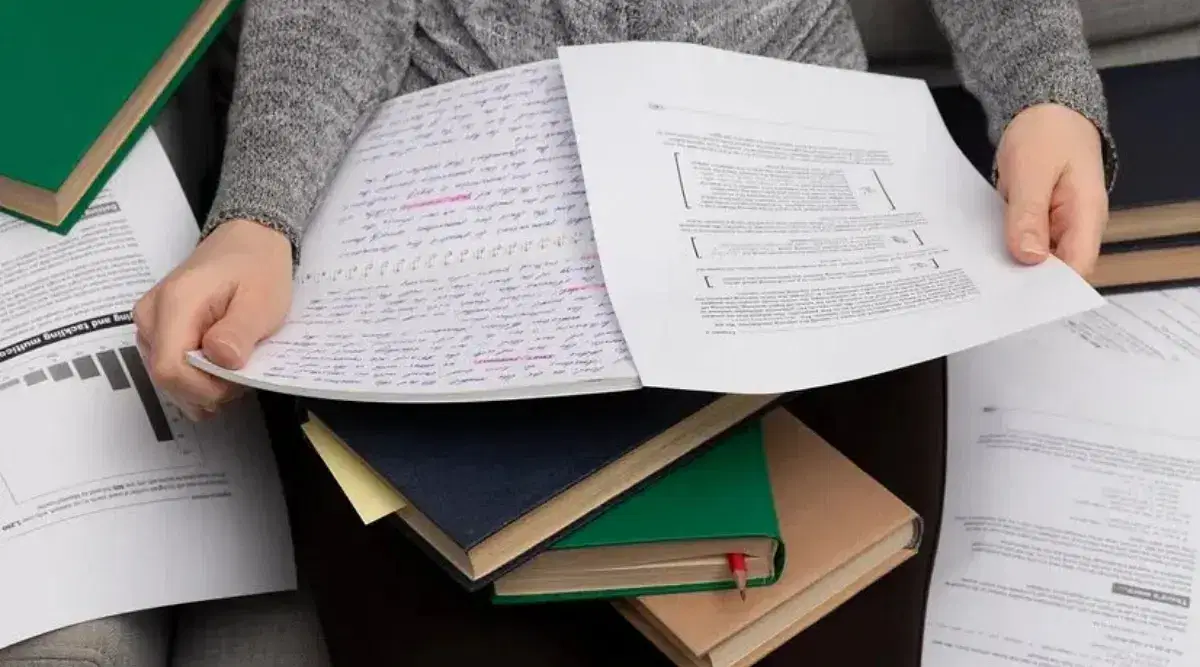Looking for the best Electrochemistry NEET notes? Get a detailed overview, weightage, important topics, and expert tips for NEET 2025. Download PDF notes for quick revision!
Table of Contents
- Electrochemistry Chapter Overview for NEET 2025
- Electrochemistry NEET Weightage
- Important Topics in Electrochemistry for NEET
- Electrochemistry NEET Notes PDF: Download Link
- Benefits of Studying Electrochemistry NEET Notes
- Tips to Study Electrochemistry for NEET 2025
- Common Mistakes to Avoid While Studying Electrochemistry
Electrochemistry NEET Notes: Electrochemistry is an important topic of NEET Chemistry under Physical Chemistry. Understanding the interrelationships between chemical reactions and electrical energy is vital. This chapter has a 1-2 direct question asked in the exam each year with a weightage of approximately 5%.
Among the tested topics the important ones are electrochemical cells, the Nernst equation, conductance, Faraday’s laws etc. For this section, students have to study notes that contain all topics, formulas, and practice problems in a well-structured manner for NEET 2025.
Students can find the Electrochemistry NEET notes along with important topics, weightage and tips that will improve students’ ability to prepare effectively.
Electrochemistry Chapter Overview for NEET 2025
Under Physical Chemistry, electrochemistry is a crucial component of the NEET curriculum. By bridging the gap between electrical energy and chemical reactions, it sheds light on the transformation of chemical energy into electrical energy and vice versa. In addition to being important from an academic standpoint, this subject has practical uses in fuel cells, batteries, and electroplating.
The field of physical chemistry known as electrochemistry studies the connection between electrical potential, which is a measurable and quantitative phenomenon, and recognizable chemical changes. Electrical potential is the result of a certain chemical change, or vice versa.
An electrically conducting and electrically insulating electrolyte (or ionic species in a solution) separates the electronically conducting phase—typically but not necessarily an external electrical connection, as in electroless plating—that transports electrons between electrodes.
Importance of Electrochemistry
The definition of an electrochemical cell and its use in separating the constituent atoms and ions of salts in a solution is thoroughly covered in Electrochemistry. This chapter imparts knowledge about inorganic chemistry, which deals with the stacking of elements in an electrochemical series.
Ions and elements can be arranged in this series according to their electrode potential. This sequence shows that the parent molecule can release an ion at an electrode. The many cell types utilized in electrolysis will also be covered in this topic.
It discusses how the unique chemical characteristics of the constituent ions in a compound can be used to provide a preferred discharge of ions. In order to produce a desired product, favourable conditions can also be established, which will lead to the creation of an appropriate electrolytic environment.
Electrochemical series have various uses, including the following:
- We can determine the sustainability of redox reactions using the electrochemical series by comparing the standard reduction potentials of different species.
- The electrochemical series determines the cell's total potential by detecting the half-reactions of oxidation and reduction.
- For a variety of applications, the electrochemical series provides alternatives for selecting appropriate electrode materials. Since they are more noble and have greater resistance to corrosion, higher-ranking metals in the series are suitable for use as electrode materials in electrolysis and electrochemical reactions.
- The development and selection of battery components depend heavily on the electrochemical series. By choosing the right metal combinations and their matching reduction potentials, batteries with precise cell potentials and efficiency characteristics may be constructed.
- Understanding the electrochemical series aids in identifying and averting corrosion.
Electrochemistry NEET Weightage
NEET Chemistry syllabus has an important portion called Electrochemistry. It forms an essential part of the overall score. This subject is under Physical Chemistry and has a weightage of 5% in the exam. There are 1-2 direct questions on Electrochemistry in NEET, every year, most often pertaining to the Nernst equation, electrochemical cells, Faraday’s laws and conductance.
Since this concerns some theoretical and numerical problems, it becomes easy for students to get good marks by understanding Electrochemistry. Students can focus on the preparation smartly by understanding the chapter’s weightage.
Weightage Following Previous Year’s Trends
The table below shows the weightage of the Electrochemistry chapter in NEET in the previous years.
| Chapter Name | 2019 | 2020 | 2021 | 2022 | 2023 | Total 5 yrs PYQ | Average Count |
| Electrochemistry | 2 | 2 | 3 | 1 | 2 | 10 | 2 |
NEET Chapter Wise Weightage 2025 for Chemistry
The table below shows the weightage of Electrochemistry in NEET Chemistry.
| Topics | Weightage (%) |
| Electrochemistry | 5% |
Also Read: Updated NEET Chemistry Syllabus, Newly Added and Deleted Topics
Important Topics in Electrochemistry for NEET
Electrochemistry is a very vast topic but some of the concepts are more frequently asked in NEET than others. To score 650 plus in NEET 2025 exam, students need to concentrate on the key areas. In addition, numerical problems based on the Nernst equation and electrochemical calculations occur in the exam.
Studying these important topics will be more conceptual and solve problems, if approached in a structured manner. Here is a list of the important topics in Electrochemistry.
- Electrochemical Cells
- Redox reactions
- Electrode Potential
- Standard Electrode Potential
- Electromagnetic Force of a Cell (EMF)
- Specific Resistance, Specific Conductivity, and Molar Conductivity
- Nernst Equation
- Commercial Cell
- Faraday’s Law of Electrolysis
- Conductance in Electrolytic Solutions
- Kohlrausch’s Law
- Electrolysis and Laws of Electrolysis
- Dry cell- electrolytic cells and Galvanic cells
- Lead accumulator
- Relation between Gibbs energy change and EMF of a cell
- Fuel cells
- Corrosion
Electrochemistry NEET Notes PDF: Download Link
Electrochemistry Notes for NEET must be very comprehensive and well organized for the part to be mastered. The notes must be proper as they will help students quickly revise, remember the important formulas, and easily understand the important concepts.
The set of Electrochemistry notes should comprise theoretical explanations, solved examples, shortcut tricks, and frequently asked questions of NEET. Thus, students can use concise Electrochemistry Notes in PDF format for studying.
The table below will have the direct link to download Electrochemistry NEET Notes.
| Subject | Download Link |
| Electrochemistry NEET Notes PDF | To Be Announced |
Also Read: NEET Chemistry Chapter Wise Weightage 2025 - Download PDF
Benefits of Studying Electrochemistry NEET Notes
The chapter Electrochemistry in NEET Chemistry teaches students vital subject matter about redox reactions as well as electrochemical cells and their electrical properties. Students find better ways to understand Electrochemistry when they use NEET notes for studying this subject.
1. Concise and Well-Organized Information- NEET students can use Electrochemistry notes as a compact summary of all core topic information which saves them from repeatedly reading extended texts. They present main definitions, necessary formulas and major subject pieces in a basic design to help students learn efficiently.
2. Time-Saving and Efficient Revision- The process to prepare for NEET must be set up to review numerous subjects quickly. Students receive better results in Electrochemistry by studying prepared notes that help them focus on core materials. Students use these notes more productively due to their condensed format which eases final exam preparation.
3. Easy Understanding of Complex Concepts- Understanding electrochemistry requires students to study multiple equations and physical laws plus all their connected reactions. Notes simplify Nernst equation, Faraday’s laws of electrolysis, and electrochemistry cells to help students understand these subjects better.
4. Better Retention and Memory Recall- Preparing notes for review stimulates better memory storage than simply studying text materials. Your notes with basic renderings become easier to remember during the exam because they show essential information in simple graphic form. When students return to their notes often they build better mental pictures of concepts while preventing memory problems.
5. Quick Formula Reference- Students need to solve electrical potential problems that involve cell measurements and electrical resistance evaluations. The Electrochemistry NEET notes provide students with easy access to essential formulas because they combine all necessary information in one location. Notes with all important equations make it faster and easier to avoid mistakes during calculations.
6. Focus on High-Yield Topics- NEET notes show which topics students must study first based on what is tested most often and what appeared in previous tests. Students who study the important topics of Electrochemistry will not miss essential exam questions.
7. Boosts Problem-Solving Skills- To perform well in NEET students must study both the theory of Electrochemistry as well as numerical problem solving. Electrochemistry study materials contain worked-out examples and practice exercises which assist students in developing their understanding of concepts and learning better problem-solving habits.
8. Enhances Exam Confidence- Going through tested notes beforehand decreases nervousness and creates a stronger mindset. A good grasp of Electrochemistry principles and formulas helps students reply to NEET exam questions more quickly and thoroughly.
9. Helps with Last-Minute Preparation- The short time before NEET requires effective note review instead of reading all book material. Students can learn all Electrochemistry chapter content efficiently through notes in short preparation periods before their final exam.
10. Useful for Multiple Revisions- Students should study Electrochemistry subject matter many times to succeed in the NEET preparation process. The ease of revising Electrochemistry material through notes helps students learn better from their multiple reviews by keeping the information direct and focused.
Tips to Study Electrochemistry for NEET 2025
Electrochemistry stands as a significant subject in NEET Chemistry studies through both problem-solving exercises and concept questions. Due to its importance, you need to study Electrochemistry deeply to get better results. You can study Electrochemistry for NEET 2025 more effectively by using these proven study methods.
1. Understand the Basics First- Build essential fundamental knowledge about oxidation-reduction reactions, electrode potential and electrolytic behaviour. Basic knowledge will make it easier to learn advanced Electrochemistry topics.
2. Memorize Important Formulas- Students need to know the Nernst equation, Faraday's laws of electrolysis and Gibbs free energy formula. Design a specific formula sheet and update it often to help you recall information faster at test time.
3. Focus on Conceptual Clarity- Most NEET electrochemistry questions measure how well students understand important material instead of checking for factual memory. Study the basics of electrochemical cells and their differences from galvanic and electrolytic cells with standard electrode potential explanations.
4. Practice Numerical Problems Daily- Students need to practice numerical Electrochemistry problems every day to improve their results. Practice mathematical exercises that deal with cell potential measurements and conductance and electrolysis testing to advance your processing speed and accuracy.
5. Use visual learning tools- Using pictures of diagrams along with organized plans and lists makes difficult information simpler to understand. Illustrate electrochemical cells with proper labels and study easy ways to recall standard electrode potentials of basic elements.
6. Solve Previous Year NEET Questions- Studying past NEET exam papers shows students which electrochemical topics the exam asks about. Studying NEET previous year question paper will show you what topics to focus on and make you better at answering similar questions in the test.
7. Use NCERT textbooks as your base- The NEET Chemistry examination covers Electrochemistry topics taken mainly from NCERT textbooks. Study all NCERT content from the Electrochemistry chapter because many straightforward questions come directly from this source. Highlight important definitions and explanations.
8. Practice Mock Tests- Practice Electrochemistry questions under timed conditions by taking NEET mock sample tests. Taking complete practice tests and segment quizzes shows you your study progress. Set a timer as you answer questions to get better at solving the problems quickly.
9. Revise Regularly- People lose their understanding of Electrochemistry when they do not practice it regularly. Regularly review your solved numerical problems and return to them throughout your study period to memorize the topics better.
10. Clarify Doubts Without Delay- When you fail to understand a topic or calculation make it clear right away. You should rely on online resources or academic materials along with seeking instruction from your teachers when you lack topic comprehension.
Also Read: NEET Chemistry Question Paper 2023, 2022, 2021 - Download PDF
Common Mistakes to Avoid While Studying Electrochemistry
NEET Chemistry has many high-scoring topics one of them being electrochemistry. Incorrect answers can occur due to many students making mistakes in the exam. This will make you understand better and avoid these common errors which will improve accuracy.
1. Ignoring Conceptual Understanding- Most of the students tend to just memorize formulas without understanding the base concept. Fundamental principles of electrochemistry such as oxidation-reduction reactions, electrode potential, and electrochemical cells should be learnt before using the formulas.
2. Forgetting Sign Conventions- The most common mistake, however, is the lack of attention to the appropriate sign convention. For instance, in the Nernst equation, it is important to know when to use positive or negative electrode potential. This can completely change your answer depending on the signs.
3. Not knowing the difference between Galvanic and Electrolytic cells- Galvanic (voltaic) and electrolytic cells are easily confused among the students. The electricity that is produced using a galvanic cell is produced due to spontaneous redox reactions, whereas electricity generated by an electrolytic cell requires an applied voltage to drive the reverse reaction. It is possible to have incorrect answers if we mix up their working principles.
4. Overlooking the Importance of NCERT books- One of the NEET topics from which the NCERT textbooks give direct questions is electrochemistry. Skipping NCERT books and only depending on reference books may leave out on very important information that is going to be asked in the exam.
5. Not Practicing Enough Numerical Problems- Electrochemistry has lots of numerical questions that can yield mistakes in solving cell potential, conductance and electrolysis calculations. A lack of practice can involve a lot of mistakes when solving numerical problems. Practice is necessary to get accuracy and speed.
6. Confusing Standard Electrode Potentials- Standard reduction potentials of elements have an important part in the determination of whether or not a reaction will take place in an electrochemical cell. Oxidation and reduction half-reactions can be mixed up and lead to incorrect calculations and answers.
7. Ignoring the Effect of Concentration on Cell Potential- Many students fail to give importance to the Nernst equation, which explains how concentration changes affect cell potential. NEET frequently tests this concept and failure to comprehend it can lead to wrong prediction of voltage changes in electrochemical cells.
8. Not Revising Regularly- If electrochemistry concepts are not revised, then they can be easily forgotten. Last-minute confusion may occur if not able to review the key formulas, reaction mechanism and theoretical explanation of a topic.
9. Skipping Previous Year Questions- Previous year questions of NEET provide knowledge of often tested things and their difficulty level. Ignorance of these questions can lead you to struggle to understand the pattern of Electrochemistry which is going to be there in NEET 2025.
10. Too Many Study Resources- Adding too many books and NEET study materials may overload the student with information and lead to confusion. NCERT is a sufficient number of books to study and then one or two reference books.


























POST YOUR COMMENT